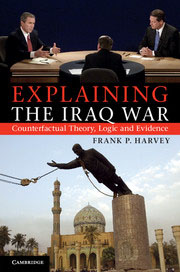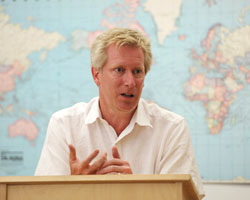What if?
It’s a question we ask ourselves all the time when reconsidering the past, and it’s guiding question behind Political Science Professor Frank Harvey’s award-winning research.
Earlier this year, Dr. Harvey won not one, but two honours from the Canadian Political Science Association for his research on the Iraq war. He took home best international relations book for Explaining the Iraq War: Counterfactual Theory, Logic and Evidence and best article for “President Al Gore and the 2003 Iraq War: A Counterfactual Test of Conventional ‘W’isdom,” published in The Canadian Journal of Political Science.
“I was both surprised and thrilled to have my work included among the nominees,” says Dr. Harvey. “I cannot imagine a better outcome than to have one’s peers acknowledge your efforts.”
 The 2013 McMenemy Prize for best article was awarded to Dr. Harvey for his paper that argues that, if Al Gore had been elected in 2000 instead of George W. Bush, Gore would have made similar decisions in regards to Iraq.
The 2013 McMenemy Prize for best article was awarded to Dr. Harvey for his paper that argues that, if Al Gore had been elected in 2000 instead of George W. Bush, Gore would have made similar decisions in regards to Iraq.
Explaining the Iraq War is based on the same hypothetical premise. Dr. Harvey presents reasoning to support his claim that the Iraq war was not a product of the Bush Presidency’s ideology but a result of various domestic and international pressures that determined America’s post-9/11 foreign and security policies. He uses counterfactual analysis to propose how Gore would have had to give way to the same pressures if he had been elected president, and provides evidence that Gore (and his senior advisers) endorsed the Iraq strategy adopted by President Bush and Prime Minister Blair.
“Counterfactual analysis, when done well, serves as a powerful tool for challenging conventional wisdom,” says Dr. Harvey.
A different history
He uses facts and carefully researched and organized analysis to counter the widespread belief that the Iraq war was a direct product of a ‘neoconservative’ agenda that would not have been relevant had Gore been elected.
“In other words, if X is necessary for Y, then the absence of X would be sufficient to avoid Y — that is the essence of counterfactual analysis,” explains Dr. Harvey.
Not all readers have readily accepted Dr. Harvey’s arguments, and his theories stand in stark contrast to the more popular belief that Bush and a few ideologically motivated advisers were to blame for the war in Iraq.
“The version of history outlined in my book spreads the blame and responsibility very widely,” he says. “I certainly did not write the book to make any friends in Washington.”
He focuses on the Iraq war as a prime example of how U.S. foreign policy is problematized by the way American bureaucracy handles intelligence and other information pertaining to national security threats. Dr. Harvey’s readers take away the conclusion that the methods of assessing and circulating this sort of information need to be reformed.
“Policy preferences have very little to do with who these leaders are, and usually have more to do with the domestic interests and international pressures leaders attempt to balance on behalf of the states they govern,” he says.
Dr. Harvey believes that actions during the Obama administration strongly support his claims, as he explains in the book’s conclusion.
“Obama’s choices when in power reinforced my interpretation of U.S. foreign policy trends, namely, that leadership and ideology make little difference when it comes to Washington’s foreign policy priorities.”
An educational objective
The author of four other books and co-editor of four more, Dr. Harvey is currently writing a paper that discusses methodologies for studying foreign policy. This paper will eventually form the basis for his next book, a guide for scholars who wish to analyze competing theories of major global events.
 Dr. Harvey, who has had his writing appear in numerous journals and newspapers, is also working on a SSHRC-funded research project that will take a close look at Canada-U.S. border security negotiations. He hopes the project will provide possible explanations of why ideas for border security improvements have not been implemented.
Dr. Harvey, who has had his writing appear in numerous journals and newspapers, is also working on a SSHRC-funded research project that will take a close look at Canada-U.S. border security negotiations. He hopes the project will provide possible explanations of why ideas for border security improvements have not been implemented.
He brings his research methods to the classroom as well, asking students in his Global Violence class to complete counterfactual exercises. The goal of these assignments is to challenge existing historical documentation of major conflicts by logically predicting the future effects of a hypothetical change in these histories.
“I think these two goals (explaining the past and improving the future) are connected,” says Dr. Harvey, “because learning the right lessons through counterfactual analysis can be essential to developing effective policies to prevent similar mistakes from recurring in the future.”

